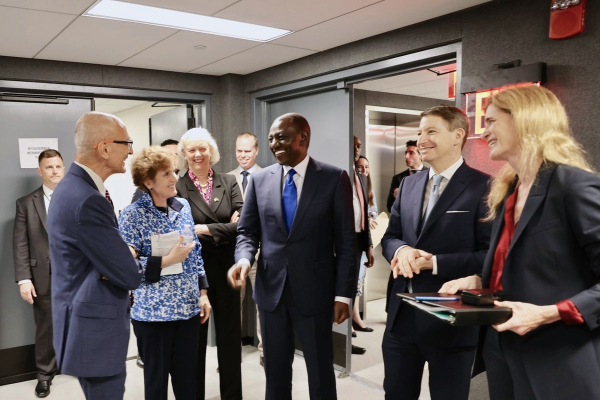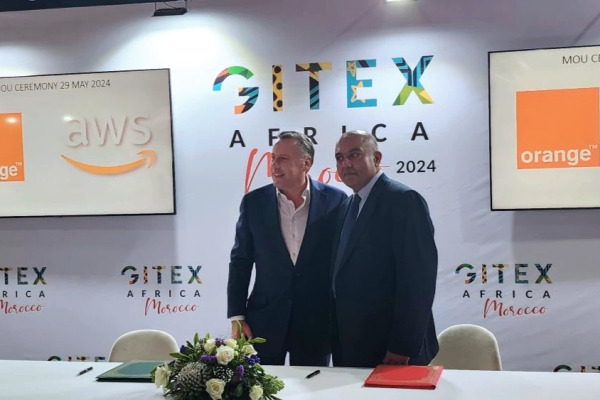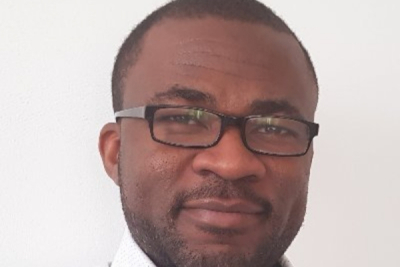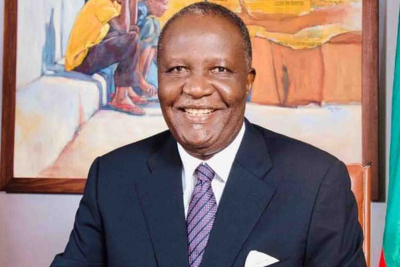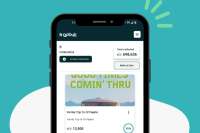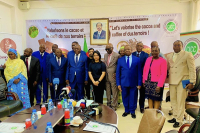Investments in digital sectors are vital for Africa's development, providing a blueprint for integrating digital and sustainable solutions to stimulate economic growth. Enhanced connectivity and e-mobility initiatives will create jobs, lower transaction costs, and improve access to services and markets, promoting sustainable development across the continent.
Kenya's digital and sustainable mobility sectors received a $250 million investment from the US International Development Finance Corporation (DFC) during President William Ruto's state visit to Washington, DFC announced on May 23.
“With this week’s announcements, DFC is doubling down on its commitments to Kenya’s development, with investments into energy, e-mobility, and infrastructure,” said DFC CEO Scott Nathan.
The financing, a mix of loans and grants, targets key Kenyan companies including M-KOPA, BasiGo, Mogo Auto, Roam Electric, and Pezesha Africa Limited.
M-KOPA secured $51 million to enhance digital connectivity and provide affordable smartphones, with plans to expand its production facility. Mogo Auto Kenya and BasiGo received $10 million each to support used vehicle loans and electric bus manufacturing. Roam Electric also received $10 million for electric vehicle development and charging infrastructure, while Pezesha was granted $500,000 to improve SME credit scoring algorithms using advanced technologies.
This move aligns with Kenya’s Digital Economy Blueprint, which aims for universal digital access and participation. The USAID Digital Ecosystem Country Assessment (DECA) 2020 highlights Kenya’s robust ICT infrastructure, with 95% of the population covered by 2G, 88% by 3G, and 61% by 4G, and plans for 5G rollout.
President Ruto’s visit to Washington emphasized strengthened US-Kenya relations and investments in digital and renewable energy. With support from the US government, DFC, and tech giants, Kenya is set for significant advancements in digital and sustainable energy sectors, driving technological growth, economic development, and job creation.
Hikmatu Bilali
Less than 2% of global data centers are located in Africa. However, since the Covid-19 pandemic, cloud computing has garnered increasing interest, becoming a valuable alternative for businesses looking to digitize.
Orange Middle East & Africa (OMEA) and Amazon Web Services, Inc. (AWS) announced on Wednesday, May 29, the signing of a partnership on the sidelines of the GITEX Africa technology fair in Morocco. The initiative aims to introduce AWS Wavelength in Morocco and Senegal by the end of the year. This solution will enable startups, businesses, and public agencies to process and store their data locally.
“The announcement of AWS Wavelength Zones for North & West Africa is a major achievement in our strategy to foster the cloud transformation of African businesses. We will help Moroccan and Senegalese organizations of all sizes benefit from AWS, while ensuring local data hosting in Orange’s secure data centers, along with our best connectivity solutions,” said Jérôme Hénique, CEO of Orange Middle East and Africa.
In addition to establishing the first AWS Wavelength zones in Africa, this initiative also marks the introduction of the first Wavelength zones in countries without existing AWS regions or local zones. As part of the partnership, Orange will handle the hosting of services in its data centers, ensuring optimal security and reliability for users.
This partnership comes at a time when the demand for IT services in Africa continues to grow, attracting cloud computing operators. According to a report published in February by the audit and consulting firm PricewaterhouseCoopers (PwC), more than 80% of African businesses that have already partially or fully migrated to the cloud plan to increase their investments in this technology due to its positive impacts on their operations.
The introduction of AWS Wavelength is expected to allow customers to benefit from the cloud's on-demand, pay-as-you-go pricing model. This will enable them to keep their data localized while enjoying the same reliable, secure, and high-performance infrastructure as AWS regions.
Samira Njoya
She has worked as a communications manager in various organizations. She leverages her expertise to inspire and empower women in the digital field while fostering a supportive and collaborative community.
Josceline Yvonne Andriamiarintsoa, a Malagasy digital communication specialist and entrepreneur, is the founder and CEO of Ladies’Gital, a company committed to advancing women’s empowerment in the digital realm.
Established in 2021, Ladies’Gital is devoted to nurturing digital entrepreneurship among women. The company organizes programs and workshops aimed at enhancing women’s digital skills. It also facilitates connections between these women and international partners seeking support for their digital strategies.
Ladies’Gital has created a community where women engaged in the digital sector, as well as those aspiring to join, can exchange insights and interact. The company’s service offerings include community management, virtual assistance, and copywriting.
Andriamiarintsoa is an alumnus of the University Institute of Madagascar, where she earned a master’s degree in Business Management and Administration in 2016. She also holds a master’s degree in Media, Society, and Development, with a focus on Organizational Communication, which she obtained from the University of Bucharest in 2022.
Her professional career in digital communication began in 2015 at Mada Creative Agency, where she worked as an SEO content writer. She subsequently freelanced for TactikMedia for two years as a content creator and translator. In 2016, she assumed the role of Communications Manager and Community Manager at the Alliance Française of Antananarivo.
In 2019, she joined the International Organization of La Francophonie (OIF) as a Communications Officer. From 2021 to 2023, she held the position of Regional Communications Manager for the Agence Universitaire de la Francophonie in Central and Eastern Europe.
Melchior Koba
Positioned as one of the pioneers in the Rwandan ecommerce sector, the platform targets moms, busy people, singles, new residents, and the Diaspora.
Murakali is an e-commerce solution developed by a young Rwandan startup, enabling users to make purchases through its web and mobile platforms. Based in Kigali, the startup was founded in 2015 by Yvette Uwimpaye.
Its mobile app is available on iOS and Android, with over a thousand downloads. Users can create an account with their personal information and access the startup's services. They can purchase a variety of products online, such as household items, groceries, general food products, baby items, and more.
Uwimpaye describes Murakali's target audience as "moms, busy people, singles, new residents, the Diaspora that want to shop for their families living in Rwanda, and for organizations that need to shop for office consumables and office stationery."
The startup’s competitive edge lies in its ability to aggregate offerings from various retailers alongside its own inventory. This approach fosters a diverse product selection, giving customers access to a wider range of specialized shops within the Murakali marketplace.
It also provides a delivery service and has partnered with the American company DHL for international deliveries. While awaiting expansion to other African countries, Murakali already has customers outside Rwanda, including in Uganda, Kenya, and even beyond the continent in the United States and Switzerland.
Adoni Conrad Quenum
A digital transformation specialist, he contributes to the evolution of the agro-industry with technological solutions that boost efficiency, ensure food safety, and promote economic growth.
Bertrand Foffe (photo) is one of the co-founders and the CEO of Jangolo, a startup revolutionizing the agricultural landscape through the power of digital technologies. A Cameroonian-born, he founded the company with Rodrigue Kwanga and Paulin Nguekam.
Established in 2016, Jangolo serves as a bridge between farmers, agro-industries, restaurants, and consumers, fostering a transparent and efficient agricultural value chain. The company aims to reduce post-harvest losses and facilitate access to information for farmers and agribusinesses. It also seeks to ease market access for local producers by digitizing agro-food value chains.
"Our goal is to transform the African agro-industrial landscape, making it more productive, sustainable, and technologically advanced. Jangolo envisions a future where every stakeholder has access to the tools for success," reads the startup's LinkedIn page.
Bertrand Foffe graduated from Fontys University of Applied Sciences with a bachelor's degree in Information and Communication Technology in 2012. He began his professional career in 2013 at GasTerra, a natural gas and green gas wholesaler, as a software engineer.
He later held software engineering positions at several energy companies such as Powerhouse and Essent. He also worked as a solutions engineer at Philips, Rabobank, and Accenture, a company that helps large enterprises, governments, and other organizations build their digital infrastructure, optimize operations, accelerate growth, and improve citizen services.
Melchior Koba
By enhancing digital infrastructure and connectivity, initiatives across the continent benefit citizens and contribute to broader advancement. Additionally, connecting with neighboring countries promotes regional integration and collaboration, paving the way for shared prosperity throughout Africa.
Zambia's Information Minister, Felix Mutati (pictured), recently announced plans to connect the country to eight neighboring nations next month via fiber optic cables, according to a May 27th Facebook post by the Ministry. This initiative aims to position Zambia as a regional connectivity hub and bolster the national digital sector.
Minister Mutati highlighted Zambia's existing connection to Angola. “Zambia has completed connecting itself to Angola by optic fiber and the next target is Mozambique,” he said.
According to the World Bank, in its “Accelerating Digital Transformation in Zambia DIGITAL ECONOMY DIAGNOSTIC” 2020 report, Zambia’s Broadband affordability meets international benchmarks, and mobile phone usage has grown to 15.5 million subscriptions in 2019, with 63.5 percent using broadband. The digital infrastructure is established, allowing focus on its utilization, reliability, and security. However, last-mile connectivity remains a gap, limiting digital system use in sparsely populated areas where it could reduce transaction costs and improve access to services and markets. These proactive ICT measures are expected to drive economic growth, enhance connectivity, and solidify Zambia's regional ICT hub status.
Hikmatu Bilali
In an effort to simplify fundraising for various projects, tech entrepreneurs have developed an innovative technological solution. This new platform is designed to streamline the process of securing funds, making it more accessible and efficient for entrepreneurs and project managers alike.
Nobuk, a financial technology solution developed by a Kenyan startup, provides a platform for users to raise funds for a diverse range of projects. The startup, established in 2022 by Jani Landman and Elvis Bando, is based in Nairobi and has launched a mobile application that is accessible on both iOS and Android platforms. The app has already been downloaded more than a hundred times from the Play Store.
After downloading the app, users can tap on the “Login” button and then “Sign up” to create an account. They are required to enter their first and last names, email address, phone number, and set up a password. Once registered, users can initiate their projects, defining the nature and objective of the fundraising campaign. A payment link is then generated, which can be shared on social media or sent directly to potential contributors via various communication channels.
The payment process via the shared link does not necessitate the download of any additional applications. Contributors can simply click on the link, complete their payment through mobile money or bank transfer, and download the payment receipt with a single click. Nobuk proves to be a valuable tool for donations, fundraising, contributions, or group payments. The solution also enables users to monitor all incoming payments and sends alerts for goal achievements or any discrepancies.
While downloading the app and creating an account are free of charge, usage of the solution incurs a fee. The startup offers monthly subscriptions ranging from 500 Kenyan shillings (approximately $3.79) to 2,500 Kenyan shillings. These subscriptions come with various perks, such as offline payment via USSD, payment through WhatsApp, customization of payment link images, and the number of contributors allowed to participate in the projects.
Adoni Conrad Quenum
Chad is grappling with significant challenges in digital development, which have led to considerable delays in this sector. Over the next five years, the new president is determined to tackle these issues and promote inclusive digital development.
Newly elected Chadian President Mahamat Idriss Déby is championing digital technology as a cornerstone of national development. His program outlines a series of initiatives to accelerate Chad's ongoing digital transformation and usher the country into the digital age.
Déby's vision hinges on achieving full internet connectivity across Chad by 2029. This ambitious goal necessitates upgrading digital and telecommunications infrastructure to deliver high-speed, affordable internet access nationwide, with a particular focus on bridging the digital divide in rural areas.
Education is another pillar of Déby's plan. He proposes integrating digital technologies into the national curriculum, ensuring internet access in all schools, and equipping teachers with the skills to deliver digital education programs. By preparing young generations for the digital job market, Chad aims to secure its future prosperity.
Recognizing the importance of e-government, Déby prioritizes digitizing public services to enhance efficiency, transparency, and accessibility. His plan involves establishing a unified national portal, consolidating services offered by each ministry, and implementing a unique digital identity system. Citizens will be able to conduct a variety of administrative tasks online, streamlining processes and reducing time and costs compared to traditional methods.
To nurture a vibrant ecosystem for small and medium-sized enterprises (SMEs) and technological innovation, President Déby proposes supporting entrepreneurs through tax incentives, funding, and dedicated infrastructure. "Entrepreneurial initiatives and young people will be supported through partnerships, sponsorships, and mentorships with partner countries," the action plan states. "They will have facilitated access to various administrations to simplify administrative procedures and receive guidance." Additionally, technological incubators will be established to foster startups and innovative projects, providing environments conducive to creativity and development.
President Déby's plan envisions transforming Chad into an open, connected, and prosperous nation by 2029, offering equal opportunities for all citizens. By strengthening digital infrastructure, modernizing public services, and fostering innovation, Chad aspires to become a key player in Africa's digital economy.
Samira Njoya
As a serial entrepreneur specializing in the logistics industry, he designs technological solutions to facilitate the transportation of goods in Africa.
Wilfried Dabire (photo) is an Ivorian entrepreneur and the founder/CEO of Eazy Chain, a startup that aims to revolutionize the logistics industry in Africa. Through that startup, he developed a digital logistics platform that enables small businesses to efficiently manage, track, and pay for their shipping operations on a global scale.
Founded in 2023, Eazy Chain is a digital freight company that simplifies the shipping process for goods via air, sea, and road, handling customs clearance and trucking. Its unique platform streamlines complex logistical workflows, providing an integrated solution for shipping and supplier payments.
Wilfried Dabire is also the founder and CEO of Togo Cargo, a company launched in 2020 that specializes in air, sea, road, and rail freight. Togo Cargo allows its clients to send and receive packages worldwide. The company offers warehousing, goods handling, and moving services, among others.
In addition to his businesses, Wilfried Dabire has been organizing TED conferences in Lomé since 2022. He is also the main organizer of the Climathon in Togo since 2023. He serves as the CEO of WillevaSalt Company, an Ivorian firm specializing in the distribution of salt and chemicals. Furthermore, he is part of the cabin crew of Asky Airlines in Togo and sits on the local board of the global network World Merit in Côte d’Ivoire.
The serial entrepreneur graduated from the Abidjan Institute of Technology with a bachelor's degree in accounting in 2007. He also holds a flight attendant diploma from the Ethiopian Aviation Academy, obtained in 2011, and a diploma in maritime studies from the Ocean Star Sailing Academy in South Africa, obtained in 2013.
Melchior Koba
In recent years, Africa has struggled to attract the necessary capital to strengthen its technology sector. However, upcoming investments are expected to further bridge the digital divide across the continent.
U.S. payments giant Mastercard (MA.N) and the African Development Bank (AfDB) announced a wide-ranging partnership on Friday to bring digital access to 100 million people and businesses across Africa over the next decade.
The initiative, dubbed the Mobilizing Access to the Digital Economy (MADE) Alliance: Africa, was unveiled during the U.S.-Africa Business Forum hosted by the U.S. Chamber of Commerce.
"Across Africa, people are driving new growth and opportunity, and Mastercard wants to support their success," said Michael Miebach, Mastercard CEO. "This Alliance builds on the innovations and investments we are already making with partners in 45 countries to enhance Africa’s digital infrastructure and accelerate inclusive growth."
The AfDB will dedicate $300 million to support the alliance's programs. These funds will be used to bolster digital infrastructure and incentivize ecosystem players to improve digital access. Mastercard, in turn, will focus on registering 15 million users on its Community Pass platform within five years. To achieve this, they will develop interoperable digital infrastructure to facilitate participation from various stakeholders within the digital ecosystem.
The initial phase of the project will prioritize the agricultural sector and empower women. A pilot program launching this year will target three million farmers in Kenya, Tanzania, and Nigeria. Working with local banks, the program will provide these farmers with digital identities and access to high-quality seeds and agricultural inputs. The alliance plans to expand its reach to Uganda, Ethiopia, Ghana, and other African regions.
This project aligns with the digital innovation investments announced by U.S. Vice President Kamala Harris during the forum. These initiatives aim to provide large-scale digital access across Africa, a move that comes amidst a decline in foreign investment on the continent. According to the United Nations, foreign direct investment in Africa dropped from $80 billion in 2021 to $45 billion in 2022.
Samira Njoya
More...
The solution was developed to revolutionize the African e-commerce sector and help platforms reach their full potential.
Dukka is a fintech solution developed by a Nigerian startup. It allows users to automate daily operations through its web and mobile platforms. Founded in 2020 by Keturah Ovio and based in Lagos, the startup has raised $1.5 million to support its growth.
The solution offers an app available on iOS and Android, which has already been downloaded over 50,000 times according to Play Store data. Upon installation, users can create an account and gain access to a suite of services.These include inventory management, generating electronic invoices and receipts, accepting any form of digital payment chosen by customers, and accessing simple accounting tools.
"Be it a solopreneur, or a mid-size business with staff and multiple locations, Dukka’s technology turns anyone into a merchant. [...] Our ecosystem allows anyone to pay and be paid, manage inventory, track sales and expenses across one or multiple locations, gain micro insights on business performance, and sell online. Consumers are able to securely discover, shop, and spend on vetted merchants," Keturah Ovio told Disrupt Africa in February 2024.
Dukka aims to establish an entire ecosystem to facilitate the growth of e-commerce. This goal aligns with broader trends across the African continent, where startups are increasingly thriving. According to Partech Africa data, e-commerce startups attracted $298 million in equity funding through 79 deals in 2023. Notably, this figure ranks second only to the fintech segment, which raised an impressive $852 million across 113 deals.
"We’ve seen over 100,000 users onboarded onto our platform, with over 90,000 users of our software in Nigeria. We beta-launched our payments infrastructure solution in the second half of 2023 to a couple of hundred customers who really helped us define and figure out our pricing model and refine our monetisation strategy," added Keturah Ovio.
Adoni Conrad Quenum
Bien qu’elle ait passé de nombreuses années aux Etats-Unis, elle reste très attachée à son pays, le Nigeria. Elle souhaite contribuer au développement de l’Afrique en créant des solutions technologiques qui facilitent l’accès aux services financiers pour tous sur le continent.
Fara Ashiru Jituboh (photo) est une informaticienne et une entrepreneure nigériane. Elle est la fondatrice et la présidente-directrice générale d’Okra, une start-up financière ouverte qui permet aux entreprises et aux développeurs du continent africain de créer des solutions financières innovantes.
Créée en 2020, Okra facilite l’interconnexion des comptes financiers des particuliers avec leurs applications préférées, tout en offrant aux entreprises un accès sécurisé aux données financières et aux paiements grâce à une intégration unique. Cette plateforme regroupe diverses institutions financières, y compris des banques.
La start-up sert de pont entre les entreprises, les institutions financières et les utilisateurs au sein d’un écosystème financier unifié et inclusif. L’objectif de l’entrepreneure et de son associé David Peterside, à travers cette entreprise, est de numériser les services financiers en Afrique.
Fara Ashiru Jituboh a grandi aux Etats-Unis. Elle est diplômée de la North Carolina Agricultural and Technical State University où elle a obtenu en 2010 un bachelor en informatique. En 2014, elle a cofondé la start-up Shixels Studios, une entreprise de développement de logiciels, dont elle a été la directrice technique jusqu’en 2019.
Après l’obtention de son diplôme, Fara a travaillé comme analyste et développeuse d’applications chez JP Morgan Chase de février à juin 2011. Elle a également été ingénieure logicielle pour diverses entreprises, dont ImageQuix, GottaPark, Digital Additive, Dorsata et Pexels. En 2019, elle a travaillé comme consultante chez Canva qui venait d’acquérir Pexels.
Melchior Koba
Lire aussi:
Au Nigeria, Femi Aluko fournit des services de livraison à la demande
Zimbabwe has granted Starlink a license to operate in the country, President Emmerson Mnangagwa announced on May 25.
The move aligns with Zimbabwe's Vision 2030, focusing on innovation, science, and technology.
The license aims to enhance internet access and support Zimbabwe's technological and economic goals.
As an experienced entrepreneur, he has demonstrated his skills and expertise in the information technology and services sector. He has led ambitious projects and provides innovative solutions to the current challenges facing Africa.
Chisepo Chirwa (photo) is a Zambian computer scientist and entrepreneur. He is the co-founder and CEO of Bosso, a startup leveraging technology to facilitate construction.
Founded in 2022, Bosso offers an online platform where future homeowners can find all the products and services needed to build their homes. By partnering with manufacturers, hardware stores, developers, and contractors, Bosso aims to make housing more affordable in Africa.
The company also collaborates with financial institutions to help clients secure funding. It provides several options, including "buy now, pay later," traditional mortgages, and a "save now, build later" approach.
Before Bosso, Chirwa co-founded the mobile application Z’POS in 2016, which allows users to record their business transactions to easily track their company's performance. Initially the startup's COO, he served as CEO from 2018 to 2019.
Chisepo Chirwa holds a bachelor's degree in computer science from the University of Greenwich, London, earned in 2012. He was awarded the Mandela Washington Fellowship in 2021, completing business management training at Clark Atlanta University.
Between 2012 and 2015, Chirwa was a network marketing professional with Forever Living Products International Company. There, he established distribution and sales teams across Southern Africa for various health and beauty industry products.
Melchior Koba


